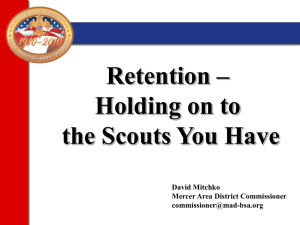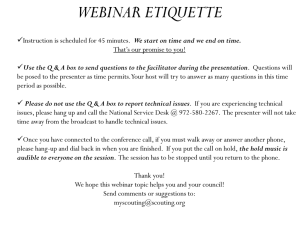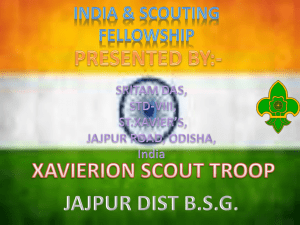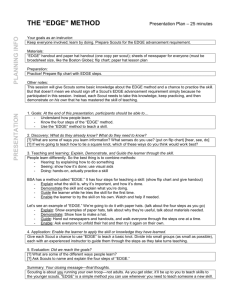File
advertisement
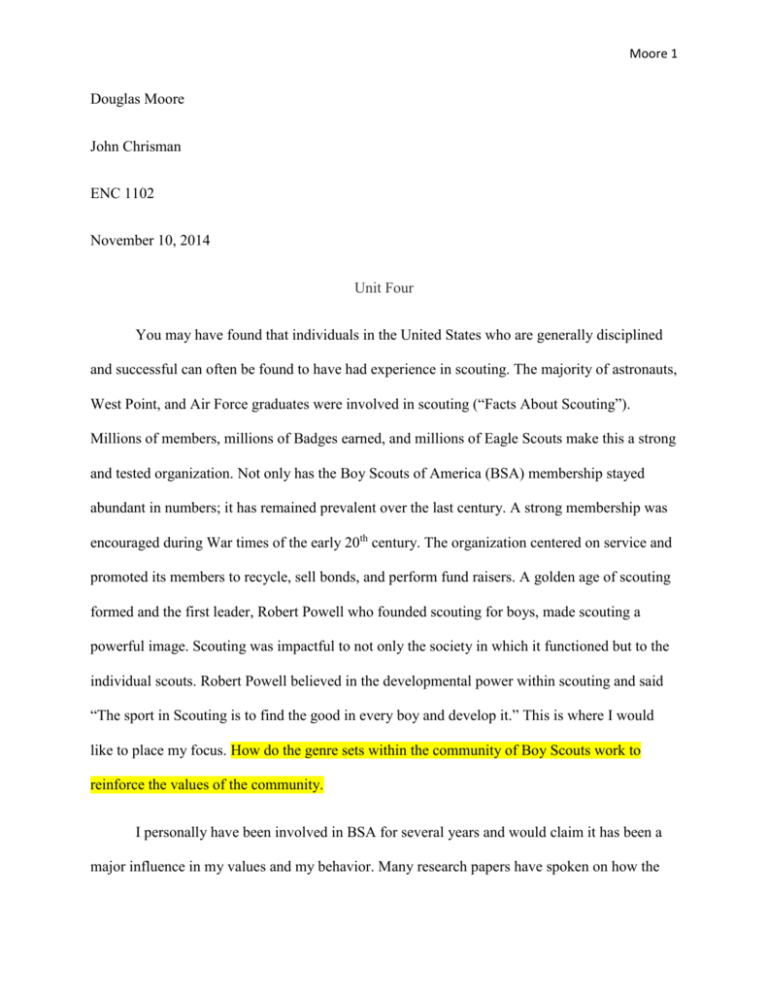
Moore 1 Douglas Moore John Chrisman ENC 1102 November 10, 2014 Unit Four You may have found that individuals in the United States who are generally disciplined and successful can often be found to have had experience in scouting. The majority of astronauts, West Point, and Air Force graduates were involved in scouting (“Facts About Scouting”). Millions of members, millions of Badges earned, and millions of Eagle Scouts make this a strong and tested organization. Not only has the Boy Scouts of America (BSA) membership stayed abundant in numbers; it has remained prevalent over the last century. A strong membership was encouraged during War times of the early 20th century. The organization centered on service and promoted its members to recycle, sell bonds, and perform fund raisers. A golden age of scouting formed and the first leader, Robert Powell who founded scouting for boys, made scouting a powerful image. Scouting was impactful to not only the society in which it functioned but to the individual scouts. Robert Powell believed in the developmental power within scouting and said “The sport in Scouting is to find the good in every boy and develop it.” This is where I would like to place my focus. How do the genre sets within the community of Boy Scouts work to reinforce the values of the community. I personally have been involved in BSA for several years and would claim it has been a major influence in my values and my behavior. Many research papers have spoken on how the Moore 2 processes of scouting or the structure behind the organization. The majority of current papers discuss the issue of Boy Scouts of America vs. Dale case and how its holding affects other cases. Most are becoming relevant again since the recent decision starting in 2014 to allow membership of any boy to scouting regardless of sexual orientation. A read into the current scouting articles provides an unfair representation about the actions behind scouting. Even in the past when articles discussed the structure of scouting, few points were made on its impact on values. Of the many articles I have read none have taken a perspective how the community shapes its members values’. I see this as a misfortune as I feel scouting and its impact on the individual is the reason behind much of the BSA’s significance today. The organization has been very successful and why has this organization survived past 100 years? The answer is that the community provides can instill positive morals that will last for a lifetime. Yet little to no attention is garnered on this point. Either it has become obvious and therefore assumed for articles or this aspect has been disremembered. Possibly the research is too abstract and difficult to study how much impact scouting can instill. Regardless I find the answer to the question: How do the genre sets within the community of Boy Scouts work to reinforce the values of the community? A vital question when discussing the Boy Scouts of America. This question will act as my research question for the remainder of the paper. Activity System Genres: Blue cards To begin answering my research question it is key to quickly identify the relevant aspects of Boy Scouts of America. Let us first look at the community as an activity system and identify essential parts. Genres are important for activity systems and is especially true here. Moore 3 Numerous genres are employed to successfully communicate within the organization. Many leaders, councils, and districts all have specific paperwork and jargon for communication. However I wish to maintain a focus on the basic scout and his interactions within the community; then eventually on the scout’s values’. As a scout, familiarity with written genres is vital for progression. To advance as a scout in rank you must complete merit badges in each rank. The rank of Eagle Scout calls for at least 21 merit badges. Before beginning a badge a blue card is recommended, the card has a basic summation of the merit badge you are attempting. The card is about the size of an index card but carries a lot of information and must have 5 signatures on it for completion. In essence the card keeps records of the badge and the scout’s name. Ideal record keeping from the scout will carry all badges and their respective blue cards. As a developing adolescent I had never kept a record of anything, I often forgot my bank account information and needless to say is a helpful skill. The habit will assist the individual later in their taxes, financial information, personal identity, and banking information. This promotes the good value of record keeping. The manual written nature of the blue cards is effectively teaching the scouts good practice with paperwork. Now after the filling out the initial blue card information a scout can begin their badge coursework. Merit Badges Every badge has an associated packet to complete. However the packets are just tools to assist the scout in completing the real requirements. Let us analyze an example badge requirement. Here is the requirement 4a for First Aid, a required merit badge found on page 65 of the Boy Scout Handbook by Robert Birkby, “Describe the signals of a broken bone. Show first aid procedures for handling fractures (broken bones), including open (compound) fractures of the forearm, wrist, upper leg, and lower leg using improvised materials.” There is a total of 7 Moore 4 sections with an average of 7 subcategorizes each for this badge. Theses all must be answered in a packet or done with a Scout Master (we will speak on the role of the Scout Master later). A scout may be asked to complete these monthly depending on the pace they wish to take. Some merit badges can require specific tasks to be completed that need external resources. For example the small-boat sailing badge cannot be completed without a boat. Each merit badge develops the adolescent in its own rights, learning is not optional for their completion. Completion of several packets and keeping all parts recorded is no small task. As a scout there is an intimidating amount to learn. Until you attain a high rank there is much you do not know. This is helpful because scouting promotes the scout to become an excellent listener. He is placed in new situations where he is asked to get a fire started for food. The pressure and necessity of the situation will ensure he will perform well or learn well regardless of if it happens. Scouting in general assists in being an effective student. Scout Masters The Scout Master will promote scouts to advance in rank. Scout Masters are also volunteers and are not paid for their work. So often the scout has only himself to rely on when finishing the worksheet packets. The Scout Master does not finish requirements for the scouts but only promotes them to work on an individual basis. This independence can easily be a first time experience for a scout the age of eleven. It is true the adolescent may have similar formatted worksheets from school however I will assert there is a fundamental difference. Mentally school work is a necessity to nearly every child. Yet scout course work is not essential for their life and most likely is not their number one priority, especially when a student. Merit badge work is often the first consistent extracurricular activity that demands activity in diverse genres. This prepares the adolescent for future periods in their life when no one demands them to complete tasks but Moore 5 themselves. Again this is another skill which is sculpted from the adolescent to form a person with more positive values instilled into them. A scout master serves another purpose, he can always be declared the example for most situations. I was fortunate enough to have powerful scout masters which would lead impressively. These were experienced men who knew their craft. These men lead by example and would always provide the ideal image for morals. Adolescents learn significantly from observational learning. The mere sight of the scout master picking up trash creates a powerful image. The values we learn in scouting come from the scout master and from self-actualization of ourselves. The word of mouth from the scout master and the values written in the scout handbook worked as a model to which to grow by. This was a meaningful manner of generating positive values from a simple meeting or campout. Next the object (goal) is an important piece of the activity system and for the Boy Scouts of America is easy to find. The best summation of the scout’s objective is within the scout oath. It is also worth note that the oath also calls for compliance with the scout law, which lists the 12 characteristics of a scout. This oath or promise from the scout has a couple parts but fragmenting its contents for my analysis is necessary. The third line in the oath reads “I will do my best…to help other people at all times.” (Robert 27) A powerful line and an idea to strive for. Following this line it closes with “to keep myself physically strong, mentally awake and morally straight.” These thoughts come after the statement about service. This provides insight into the ideas behind scouting. Helpfulness is made virtue in scouting. The last line means to take the best care you can of your body. Health and exercise are strongly recommended and needed for many scouting tasks. Proper nutrition, learning at every opportunity, and living honestly are asked of scouts. Considering these statements, Boy Scouts of America is clearly an environment where a Moore 6 developing adolescent can find valuable growth. Some adolescent homes may lack some of these lessons. Many college students I have seen have some of the worst nutrition I have seen yet. Scouting will instill a priority for a healthy lifestyle regardless of what lessons or lack of lessons the individual has been met with. The positive written message within the goals will not be forgotten as it is said every meeting opening. The genre of the written and spoken goal keeps the values in mind for all scouts who attend these goups. The division of labor within scouting can be traced back far and include the organizational president. However it is best to look at a troop based scope. Within a troop there can be a couple to several dozen scouts. Also the Scout Master presides over the troop and plans the activities. The Scout Master has many functions and must teach the scouts. This can be done through example or by lecture or by task. Acting as a leader the master will himself promote the growth of the young scouts. There is further division among the boy scouts themselves. There is assigned roles and also positions in the troop. A few positions include: senior patrol leader, patrol leader, assistant senior patrol leader. A few roles are of quartermaster, librarian, and scribe. The community has many ways to issue responsibility. These act as divisions of labor; but what is the effect of this hierarchy? Multiple positions allow for a troop to function both smoothly and effectively. This carries an important side effect, the hierarchy assists scouts in their values. New behaviors must be learned for new situations and often youth are not involved in such a diverse hierarchy seen here. Many have duties and are expected to fill their position. As part of attaining Eagle rank an individual must act as the patrol leader for 4 months. Every serious scout will have opportunity and will be asked a role. As a patrol leader you conduct meetings, make delegated decisions, and in general lead the troop when the scout master wishes. An ideal troop will be able to function without the scout master as he is there to teach and mainly Moore 7 to assist the troop. A real responsibility can be felt as a patrol leader. This is a role that is not expected of youth often and forces the individual to develop leadership skills. As well as a respect for authority, because if this is not established, work cannot continue. These values easily transcend past the scouting experience. Finally to close on my identification of Boy Scouts of America as an activity system, rules are an important aspect of the community. The expectations of the scouts are laid out within the object that is the scout oath. Yet there are several rules that are work in addition to the basic expectations. An important rule of scouting is “Leave No Trace” the idea behind this code is to leave every environmental encounter as you found it or better. Ideal performance of this code will leave the camp or trail without the trace that you were there. Other basic rules are to obey the scout master and respect other scouts. Live the oath, be supervised on campouts, the leader should not bring their young children (Robert 267). Not all rules can be found within the scout handbook as I learned when doing my duty as color guard for a scout’s Court of Honor. In this ceremony the scout is awarded their rank advancement. As color guard you must present the flags (colors). An American and a State flag should be presented; a troop made flag can also compliment the ceremony. The American flag should have special care to not allow it to touch the floor. When delivering the American flag entering the room with a tall pole through a short doorway, I was admonished to not let it touch to floor. The ceremony itself may teach a developing adolescent respect but the more grand structure of rules behind the program all promote recognition for respecting figures or images. The wearing of the uniform and the flag promote responsibility and solemn respect for the rules established in the community. Future careers and basic citizenship will require respect for authority. The proper mentality can be found within these scouting meetings, and this is no accident. Moore 8 Advanced Analysis I like to believe I understood the meaning behind the word solemn early due to scouting. The word is often used in ceremony and perfectly describes the attitude taken towards the more “sacred” acts in scouting. Here is a common use made in the Eagle ceremony: “You are (a) marked men (man). As (an) Eagle Scout(s), you have assumed a solemn obligation to do your duty to God, to country, to fellow Scouts, and to humanity” (“Woods of Wisdom”) I have seen these words spoken to a friend of 14. The ceremony and the award are taken seriously and I have never heard of anyone diminish the achievement. This is something special for an adolescent. A major desire of youth is to be taken seriously and scouting is a means to attain that attention. The program quickly treats its members as adult. This is because that is what it aims to provide them with –a sense of duty-. I have had the opportunity to shoot rifles, shotguns, handguns. As well as the chance to throw hatchets, do saw wood work, and shoot arrows. This is all due to the opportunity scouting has provided for development. The community is mature and trusts early adolescent responsibility. The school classroom is a familiar scene to all members that join Boy Scouts of America. While in scouts they will encounter situations which are similar to school classes and with similar functioning roles. For advancement through badges some kind of instructor is needed, this can take several different forms. The written genres within the community keep the scout responsible and instill values of neatness and being a hard worker. These are both part of the scout law, a core value of scouting. The scout master may act as the instructor, a booklet, or a Moore 9 volunteer instructor. For my later years in scouting internet articles acted as an instructor for badges like photography. The scout master in particular is an important figure, and the cause of much growth. A good scout master will be knowledgeable and available for assistance. Yet he will promote scout’s thinking independently, especially since all scouts are individually expected to have basic scouting knowledge. Most actions are done as a troop or are until there is specific delegation. But advancement and drive is most importantly found on an individual basis. So essentially there is two identities of a scout. The role of a troop member and an individual scout. This is key for the reason that both roles teach different skills. In the classroom the individual centered skills can have overlap in their growth (ex. personal priorities, time management). Less often do these same students develop their team based skills as scouts do. Not to mention the added individual development is not redundant but a master of an important skill. The scouting lifestyle teaches good practices that make a smarter person. The personal finance badge is required, in this badge I had to record my expenses and income. I needed to create a budget and understand the mechanics behind keeping it. Many of these skills I find are lacking in my roommates here in college. In scouting we made virtue of being “frugal”, this does not apply to finance alone. Many ancient Indian ideals are used in the core of the scouting mentality. Prairie Indians would make use of the whole buffalo that they hunted. My scout master taught these truths and asked them of us. He also happened to be a cook and would made unforgettable desserts. The man taught me how to cook more than my parents and especially to cook with limited supplies. The values I saw in him promoted me to develop the same effective skills. The word thrifty is actually part of the scout law, and this man lived it. The knowledge I have attained from campouts with just a crockpot, fishing rod, and basic utensils has led me to live this law too. The college life does not bother me and I can easily cook great meals with Moore 10 limited budget. What other sort of adolescent community will teach these important values so early? Closing Evidence To close my research I should speak on the nature of my question before finishing. There is little available to objectively prove that scouting improves developmental values. The only way this could be done is with a set of twins separated at birth to solve the nature vs. nurture issue. Thus there is little impeccable evidence available. However there is copious amounts of data polled which finds correlation between success and if the person was involved in scouting. This data is not exactly unquestionable proof but undeniably does qualify as evidence. I will share some data to help close my point here. This study was performed by Sung Jang, Byron Johnson, and Young-II Kim. “Eagle Scouts are 62 percent more likely than non-Scouts to volunteer time to a non-religious organization.”, “Eagle Scouts are 73 percent more likely than non-Scouts [to have voted in the last election]”, “Eagle Scouts are approximately 55 percent more likely than non-Scouts [to Have held a leadership position at their workplace]”, “Eagle Scouts are 49 percent more likely than non-Scouts to say a financial goal was achieved in the last year.” This data only implies statements. Generally these figures imply a stronger involvement in many “positive” environments. This again is not evidence of anything but is data that may link to how values are instilled into scouts. Moore 11 Conclusion The discourse community of BSA offers many exciting opportunities for youth. The intentions behind the community can be seen in every motto, oath, and law. The focus of the organization is for promoting values of young individuals. An article on the positive influences from scouting officially made by the Boy Scouts of America wrote of many of the intentions behind scouting and data of its effectiveness. Here is a quote from the article describing an outcome: “Strengthen Scout's involvement with church and family. Average time spent on citizenship merit badges is 10 hours. The aim is to develop boys into participating citizens who are physically, spiritually, and mentally fit.” (Crouch). When I interviewed a fellow Eagle Scout, Christofer Padilla, he had this to say about scouting: “Ultimately it is the scout who attains Eagle. You can grow from attending Boy Scouts but you mostly get out of the program as much as you put into it. Scouting has developed me like I couldn’t have on my own. Or in the least made it easier to become independent by teaching me memorable skills.” The same experience has been true for my involvement in scouting. I consider the positive values found by attending of the Boy Scouts of America innumerable. The organization is effective because it works cohesively as a discourse community. Without any part of the activity system within the BSA it would be weaker. The hierarchy teaches respect, the individualism teaches responsibility, the roles offer chances for leadership. A developed discourse community like the BSA is functional for instilling positive morals and general character growth. The Boy Scouts of America program will continue because of this and will stay active due to its overwhelmingly positive influences on adolescents’ vlaues. Moore 12 Works Cited "Eagle Ceremony." Woods of Wisdom. Bsapackman.com, 21 Nov. 2009. Web. 10 Nov. 2014. "Facts about Scouting." Facts About Scouting. Boy Scouts of America, May 20014. Web. 28 Oct. 2014. Crouch, Larry. "Positive Impact Manual." Boy Scouts of America (2011): 1-29. Print. Powell, Robert. "Robert Powell Quote." BrainyQuote. Xplore, 28 Apr. 2003. Web. 30 Oct. 2014. Robert Birkby. Boy Scout Handbook. 12th ed. Boy Scouts of America, 2009. Print. Sung Jang, Byron Johnson, and Young-II Kim. "Eagle Scouts: Merit beyond the Badge." Bryan on Scouting. Boy Scouts of America, 10 Apr. 2010. Web. 10 Nov. 2014. Trivett, Vincent. "12 CEOs Who Got Their Start As Boy Scouts." Business Insider. Business Insider, Inc, 19 July 2011. Web. 11 Nov. 2014.
